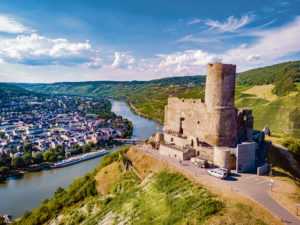When you’re standing above the valley, the scene seems almost too beautiful to be real. Vine-filled hillsides plunge toward the Mosel River. Small roads snake through vineyards, parceling the beauty into something your mind can process. And below? Well, down there lies an ideal place to begin exploring an area that is like nowhere else on earth. Down there, you’ll find Bernkastel-Kues.
Why Bernkastel-Kues?
Bernkastel’s town center is more or less the Platonic ideal of a cute German river village. You’ll find half-timbered buildings, cobblestone streets, shops, restaurants, gaslight lamps and more.

But Bernkastel-Kues isn’t a place where time stands still. These two little towns, connected by a dash and a bridge, are a functioning, thriving part of a wine community. Which means you may have the chance to see something truly magical: vintners at work. During ordinary times, this also means a world-famous harvest-time wine festival.
Even if you’re not a wine lover, you’ll still find much to love. Bernkastel-Kues is ripe with hiking and biking opportunities. River cruises are also available, and provide a totally different perspective on the area. And speaking of perspective…
The one thing you have to see: Burg Landshut
Burg Landshut is the ruined castle that towers above Bernkastel-Kues. You won’t be making the steep, short trek upward just for the castle, though. You’ll be making it for the views, which are astounding. You’ll get a sense of the profound beauty that makes the Mosel Valley so special – the vastness, the steep slopes, the bridge, the buildings, and the idea that people have clung to this land for millennia. It’s remarkable.
Getting there
By car, Bernkastel-Kues is approximately one hour and 30 minutes northwest of Kaiserslautern, around one hour and 20 minutes west of Wiesbaden and just over three hours northwest of Stuttgart. Good to know: Bernkastel-Kues has no train station.
For U.S. government employees, including service members, remember to always follow command regulations, which may be different than host nation policies, when it comes to travel.


